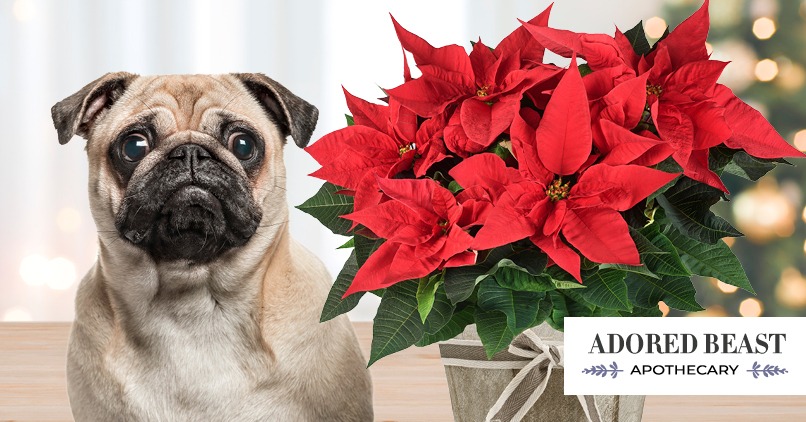We’ve all heard it before: “poinsettias and pets don’t mix.”
The poinsettia is the ultimate holiday plant. Well, aside from the tree of course. But for pet owners, despite its beautiful lush red leaves, it’s considered a no-go.
Is this reputation well deserved? Are poinsettias toxic to dogs and cats? Or, are we safe to start decorating with these lovely symbols of the season?
Poinsettias and Pets: Danger?
Myth busted: despite years existing under a dark cloud, poinsettia is actually only mildly toxic to our pets. At worst, it can cause irritation of the mouth and stomach, and in some cases vomiting.
So, how did this humble holiday plant get such a bad rep? Well, it started over 100 years ago. One unsubstantiated report of a child dying after chewing on a poinsettia leaf caused all the fuss. Since that time experts have worked on busting the myth. And with all the research, there have been zero documented cases of human or animal fatalities reported anywhere. That’s right – none. Phew.
In fact, a 1996 study found that out of 22,793 reported cases of poinsettia exposure in children, not one resulted in a fatality. What’s more, 92.4% of the subjects experienced no toxic effects at all. Sure, that’s kids, but since the initial report revolved around a child, it makes sense.
So, keeping a poinsettia on the table or counter shouldn’t pose a threat to your adored beast. If you’re concerned, just keep them well out of reach.
Other Holiday Plants?
So, if poinsettias and pets are ok, what about those other holiday plants we’re so fond of?
We know the tree is ok. Whether you’ve gone with a giant Fraser fir, a mighty blue spruce, or simple, sturdy pine, your pets are fine to be around the tree (of course just watch those decorations).
But that’s not the only plant we seem to see everywhere around the holidays. We’re talking about mistletoe. It might be nice to hang for people to steal kisses beneath (well, maybe not this year), but it’s the one that deserves the reputation as dangerous!
There are several different types of mistletoe which can be poisonous to pets. The two most common are the Phoradendron serotinum (American mistletoe) and Viscum album (European mistletoe). American mistletoe is less toxic than the European varieties, but neither one is good. The berries contain polysaccharides, alkaloids, and lectins, which, when ingested by our pets, can cause gastrointestinal irritation. The symptoms tend to be mild (e.g., drooling, vomiting, diarrhea, abdominal pain). However, if your pet eats a lot, abnormal heart rate, collapse, hypotension (low blood pressure), ataxia (walking drunk), seizures and death have also been reported.
To be on the safe side, keep your mistletoe out of reach of your dogs and cats during the holidays. If you suspect your pet has ingested mistletoe, contact your veterinarian immediately.












